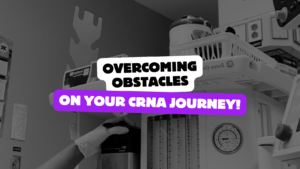Currently, many people are facing adversity and financial hardships. From decreased hours at work to loss of income completely. But now is not the time to give up on your dreams of becoming a Certified Registered Nurse Anesthetist (CRNA). In fact, strength is built through adversity. So give yourself time to get past your hardships, then get back up and stay focused on the end goal.
That being said, gaining acceptance to nurse anesthesia school is highly competitive. Since every applicant looks like you, you have to get creative in order to stand out. This is where all the extras is important. So what will make the admissions committee choose you over every other nurse anesthesia candidate? Here are 9 tips to make this a reality.
Read: How to Become a Certified Registered Nurse Anesthetist (CRNA)
1. Get great undergrad grades
The average GPA of most accepted nurse anesthesia students is greater than a 3.5. Great academic performance in sciences such as pharmacology, pathophysiology, or chemistry are a great way to demonstrate your academic ability. This is a strong indicator you can handle the rigors of a nurse anesthesia curriculum. Evidence of your academic ability is extremely important to gaining admission into a CRNA program.
2. Apply to the right CRNA programs
Prior to applying to any nurse anesthesia program you must be diligent when researching the schools in which you choose to apply to. Check out this awesome website to begin this process. After all, every program is unique and may not be the best fit for you. To increase your chances of getting into a CRNA program, plan on applying to at least three schools. While gaining admission may be tough, applying to the right schools will only increase your odds.
3. Put together an impressive CV
Your curriculum vitae (CV) is a critical part of your CRNA application. A CV is a showcase of your experience and achievements. It should be an evolving document as you and your career has evolved also. The key to creating an impeccable CV is to keep the time period relevant. For example, a CV for CRNA school should primarily focus on your experiences from nursing school and beyond.
Also carefully consider the sections you want to include in your CV. Typical sections when applying to CRNA school include education, work and volunteer experience, research, licensure and professional memberships. Now is the time to acknowledge all your accomplishments! And last proofread, proofread, proofread! This is important to spot any errors or inconsistencies in your CV before you submit your application.
4. Write a kick butt personal statement
As you prepare to apply to CRNA school, you’re probably stressed at the thought of writing your personal statement. Especially when it comes to what to write about or maybe not include at all. Your personal statement is your chance to write about anything you want to within the guidelines set by program you are applying to. In other words, you have total control over how the admissions committee see you and it allows you to show why your purpose is to be a nurse anesthetist.
Be sure to clearly highlight specific experiences and qualities which will enable you to become an excellent nurse anesthetist. If you are able to achieve this, you will definitely have a leg up on other CRNA applicants. The goal is to keep the admissions readers interested and eager to see what the next sentence is. This will make you stand out for sure!
5. Take a graduate level course
Passing a graduate level course shows the admissions committee you may fare well in their nurse anesthesia program. Your performance may also show the committee you may fare well in their program. But before going too far into graduate work, be sure you have taken all your prerequisites.
A solid graduate course to take is Statistics. It’s not too hard of a course and one which you could probably get an “A”. And after passing this course, be sure to mention it in your personal statement. Some schools may even require Statistics before you can apply to their program. So this will be a win, win situation either way. This will show you are determined and highly motivated. It also shows you can handle the complexity of the CRNA program and you already know how to study and learn. So this is half the battle to get through CRNA school.
6. Get involved in your profession
The next thing on your to do list is to get involved in the healthcare community. Not only join organizations but become an active participant. I joined the engagement committee and participated in my hospitals Habitat for Humanity. Make sure you join a committee you genuinely like and want to help grow. Programs love to see prospective candidates that are well rounded and passionate about their profession.
7. Job Shadow CRNAs for 40 hours
Shadowing a CRNA is an important part of becoming a CRNA. To fully gain an understanding of what the work of a CRNA is, you must shadow one first. Most applicants only shadow for 8 hours. In order to stand out from other applicants, I suggest you shadow a CRNA for 40 hours. Yes, I said it. Getting those 40 hours over a period of time is alright -just get it in! This goes a long way in showing the committee you know what you are getting into and you are in this for the long haul. I have included this handy CRNA shadowing log for your personal use. Just remember depending on the school you apply to, they may have their own CRNA shadowing form.
8. Get plenty of certifications
Most critical care nurses are required to take at the least Basic Life Support (BLS) and Advanced Cardiovascular Life Support (ACLS). Depending on your specialty unit you may also be required to obtain your Pediatric Life Support (PALS). Why not go a step further and obtain every certification you can. Like the CCRN, TNCC, among others.
This is the time to think outside the box. Prior to becoming a CRNA, every Monday I was the Registered Nurse who provided moderate sedation for pain management procedures in the operating room. Therefore, it only made sense to get my Certified Sedation Registered Nurse certification. These additional certifications are an indicator you are competent in critical care nursing. Also this shows you have obtained the knowledge along with gaining valuable experience while working in ICU.
Read: Stay Motivated On Your Journey With These Easy Steps
9. Attend advanced nursing seminars
There are many CRNA programs which offer seminars for prospective applicants to help candidates get a good sense of what nurse anesthesia entails and prepare for school. What better way to show you are highly motivated, ready to apply and get some hands on experience in anesthesia in the process.
I attended the Diversity CRNA Airway Management course at the University of New England prior to applying to their program. In addition to learning so much about anesthesia, I also got to learn about the school and was given the opportunity to speak with the director. This will allow you to speak about your experiences and how much you want to be a CRNA. On the other hand, it will also tell you if the school will not be a good fit for you. Another CRNA program, Wake Forest School of Medicine, also offers some continuing education programs.
Essential tips
I wanted to share some tips that will get you closer to the end goal of becoming a CRNA. After submitting your application, be sure to check on it often. And fight for your spot in the program. Getting into CRNA school is more than just making good grades and getting a high GRE scores. Everyone focuses way too much on the academic part of their application and forget to show the school who they are as a person and future anesthetist. It worked for me. So what are you waiting for?







